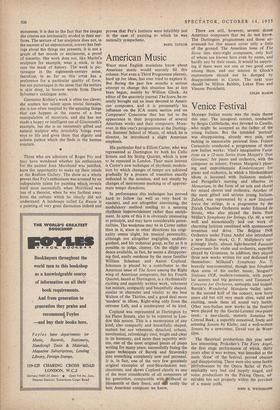American Music
WHAT most English musicians know about American music would scarcely fill this column. Not even a Third Programme planner, hard up for ideas, has ever tried to explore it. But during the past few months a serious attempt to change this situation has at last been begun, mainly by William Glock. As editor of the quarterly journal The Score, he re- cently brought out an issue devoted to Ameri- can ' composers, and it is presumably his influence on the ICA music section and on Composers' Concourse that has led to the appearance in their programmes of several American works and their composers. More- over, in this year's programmes at the Darting- ton Summer School of Music, of which he is director, he introduced a slight American emphasis.
His particular find is Elliott Carter, who was represented at Dartington by both his Cello Sonata and his String Quartet, which is now to be repeated in London. Their main interest is Carter's new technique of rhythmic modula- tion by which changes of tempo are achieved gradually by a process of transition exactly indicated in the notation, and not simply by changes of metronome marking or of approxi- mate tempo directions.
In performance this technique has proved hard to follow (as well as very hard to execute), and not altogether convincing, the modulatory method tending to a seeming rhythmic impoverishment rather than enrich- ment. In spite of this it is obviously interesting in principle, and may have considerable poten- tialities. The weakness may be in Carter rather than in it, since in other directions his origi- nality seems slight, his musical personality, although not altogether negligible, undistin- guished, and his technical grasp, as 'far as it is possible to judge, clumsy. On the slight evi- dence available, in fact, he seems a disappoint- ing find, easily outshone by the more familiar William Schuman and Aaron Copland. Schuman is placed by a contributor to the American issue of The Score among the Right wing of American composers, but his Fourth Quartet, heard at Dartington, is a rhythmically exciting and superbly written work, vehement but mature, compactly and beautifully shaped, similar in character and vitality to the best Walton of the Thirties, and a good deal more 'modern' in idiom, Right-wing only from the extreme Left, and a masterpiece of its kind.
Copland was represented at Dartington by his Piano Sonata, also to be repeated in Lon- don this season. This is a masterpiece of any kind, also compactly and beautifully shaped, mature but not vehement, detached, urbane, neoclassical, refreshingly cool, bright and clear in its harmony, and more than superbly writ- ten, one of the most original pieces of piano writing for many years, successfully fusing the piano techniques of Bart6k and Stravinsky into something completely new and personal. It is, in fact, one of the very few genuinely original examples of post-Stravinskian neo- classicism, and shows Copland clearly as one of the most considerable of all composers of his generation, comparable witfflilhaud or Hindemith at their finest, and s'M easily the best American composer we know. There are still, however, several dozen American composers that we do not know. The Dartington programmes and those an- nounced for this season cover only a little of the ground. The American issue of The Score lists sixty-eight composers, only half of whom are known here even by name, and hardly any by their music. It would be surpris- ing if there were not one or two good ones among them, and our interest in Glock's explorations should not be damped by disappointment in Carter. The next tries should be Milton Babbitt, Lukas Foss and Vincent Persichetti.
COLIN MASON










































 Previous page
Previous page